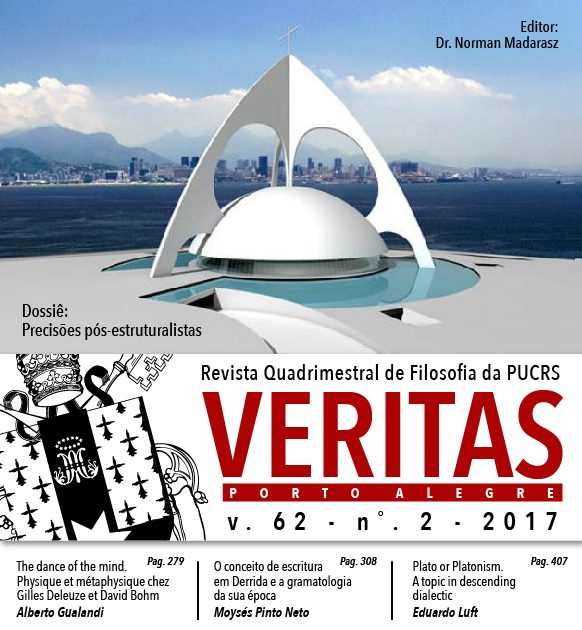Deconstructing the substantialist conception of God: recasting Heidegger's critique of Augustine
DOI:
https://doi.org/10.15448/1984-6746.2017.2.28216Palavras-chave:
ser, essência, Deus, metafísica, ontologia, substância.Resumo
***Desconstruindo a concepção substancialista de Deus: reformulando a crítica de Heidegger de Agostinho***
Neste artigo, argumento que a concepção de Deus como substância (substantia) tem sido invocada de forma equivocada pela desconstrução heideggeriana de variantes onto-teológicas e substancialistas da metafísica, na medida em que confundiram entidades (Seienden, entia, entes) com seu próprio Ser (Sein, Ens, esse), que não pode ser conceitualizado ou objetivado pelo pensamento humano, mas torna possível o seu pensamento e realidade. Apesar de Agostinho ter procurado de alguma forma conciliar uma cosmologia essencialista neoplatônica com uma cosmovisão judaico-cristã da redenção histórica, Heidegger não apenas deixa de reconhecer adequadamente seu endividamento quanto à antropologia existencial agostiniana, mas também a afirmação deste último de que a realidade dos entes e da história contingente determina, em última análise, os conceitos ontológicos em sua diferença fundamental de suas contrapartes ônticas, comprometendo destarte as críticas intuitivas de Heidegger contra a confusão entre Deus e Ser (Sein).
Downloads
Referências
Agamben, Giorgio. The kingdom and the glory: For a theological genealogy of economy and government. Trans. Lorenzo Chiesa and Matteo Mandarini. Stanford University Press, 2011.
Arendt, Hannah. Love and Saint Augustine. Edited and with an interpretive essay by Joanna Vecchiarelli Scott and Judith Chelius Stark. University of Chicago Press, 1996. [Der Liebesbegriff bei Augustin, 1929]
Augustinus, Aurelius. Corpus Christianorum: Series Latina, vols. 27 59. Turnhout: Brepols, 1953.
_______. Patrologia Latina. Paris: Migne, 1841-42.
_______. Confessions, 2 vols. Tradução de William Watts. The Loeb Classical Library. Londres: Heinemann, 1968.
_______. Augustine of Hippo: Selected Writings. Trans. Mary T. Clark. Nova York, Ramsey & Toronto: Paulist Press, 1984.
_______. The Essential Augustine. Edited by Vernon J. Bourke. Indianapolis: Hackett, 1974.
_______. On Free Choice of the Will. Trans. Anna Benjamin and L.H. Hackstaff. Nova York: Macmillan, 1964.
Barr, James. The Semantics of Biblical Language. Oxford University Press, 1961.
Brown, Peter. Augustine of Hippo: A Biography. Berkeley / Los Angeles: University of California Press, 1967. Revised Edition, 2000.
Caputo, John D. and Michael J. Scanlon, editors. Augustine and postmodernism: Confessions and circumfession. Bloomington, IN: Indiana University Press, 2005.
_______. The Mystical Element in Heidegger's Thought. Athens: Ohio University Press, 1978. Revised, paperback edition with a new "Introduction:" New York: Fordham University Press, 1986.
_______. Heidegger and Aquinas. Fordham University Press, 1982.
Coyne, Ryan. Heidegger's Confessions: The remains of Saint Augustine in Being and Time and beyond. The University of Chicago Press, 2015. DOI: https://doi.org/10.7208/chicago/9780226209449.001.0001
Derrida, Jacques. "Circumfession," in Geoffrey Bennington and Jacques Derrida, Jacques Derrida, trans. Geoffrey Bennington. Chicago/London: University of Chicago Press, 1993. [1991]
Fredriksen, Paula. Augustine and the Jews. A Christian defense of Jews and Judaism. New Haven, Conn.: Yale University Press, 2010.
Gilson, Etienne. Introduction à l'étude de saint Augustin. 2e éd. Paris: Vrin, 1943.
_______. "Propos sur l'être et sa notion," San Tommaso e il pensiero modemo, ed. Antonio Piolanti. Citta Nuova: Pontificia Academia Romana deS. Tommaso d' Aquino, l974.
Heidegger, Martin. Being and Time. Translated by John Macquarrie and Edward Robinson. New York: Harper & Row, 1962.
_______. The Basic Problems of Phenomenology. Bloomington: Indiana University Press, 1982.
_______. Sein und Zeit. Tübingen: Niemeyer, 1986. (16th edition)
_______. Phenomenology of the Religious Life. Translated by Matthias Fritsch and Jennifer Anna Gosetti-Ferencei. Bloomington: Indiana University Press, 2004.
_______. Gesamtausgabe. Frankfurt am Main: Vittorio Klostermann, 1976 - .
Horrigan, Paul Gerard. God's Existence and Other Philosophical Essays. Lincoln, NE: iUniverse, 2007.
Jonas, Hans. Augustin und das paulinische Freiheitsproblem. Eine philosophische Studie zum pelagianischen Streit. 2nd edition. Göttingen: Vandenhoeck & Ruprecht, 1965. [1930] DOI: https://doi.org/10.13109/9783666531163
Kuehn, Evan F. "The Johannine Logic of Augustine's Trinity: A Dogmatic Sketch." Theological Studies 68 (2007): 572-594. DOI: https://doi.org/10.1177/004056390706800305
Levinas, Emmanuel. En découvrant l’existence avec Husserl et Heidegger. Paris: Vrin, 1967.
Levy, Ze'ev. Baruch Spinoza: Seine Aufnahme durch die jüdischen Denker in Deutschland, Stuttgart 2001.
_______. Spinoza and the Concept of Judaism: A concept and its influence on Jewish Thought. Tel Aviv, 1972 (Hebrew), 2nd ed. 1983, 3rd ed. 1991.
Marion, Jean-Luc. Dieu sans l’être, Paris: Fayard, 1982.
Marrou, Henri-Irinée. La théologie de l'histoire: Augustinus Magister. Paris: Cerf, 1968.
_______. St. Augustin et l'augustinisme. Paris: Seuil, 1955.
O'Leary, Joseph Stephen. Questioning Back: The Overcoming of Metaphysics in Christian Tradition. Chicago: Winston Press, 1985.
Pépin, Jean. Mythe et allégorie. Paris: Éditions Montaigne, 1958.
_______. Saint Augustin et la dialectique. Villanova University Press, 1976.
Ricoeur, Paul. Temps et récit, 3 vols. Paris: Editions du Seuil, 1983-85.
Stump, Eleonore and Norman Kretzmann, eds. The Cambridge Companion to Augustine. Cambridge University Press, 2001. DOI: https://doi.org/10.1017/CCOL0521650186
von Herrmann, Friedrich-Wilhelm. Augustine and the Phenomenological Question of Time [Augustinus und die Phänomeologische Frage Nach der Zeit]. Lewiston: Edwin Mellen Press 2008.
Zarader, Marlène. La Dette impensée: Heidegger et l'héritage hébraïque. Paris: Seuil, 1990.
Downloads
Publicado
Como Citar
Edição
Seção
Licença
Direitos Autorais
A submissão de originais para a Revista Veritas implica na transferência, pelos autores, dos direitos de publicação. Os direitos autorais para os artigos publicados nesta revista são do autor, com direitos da revista sobre a primeira publicação. Os autores somente poderão utilizar os mesmos resultados em outras publicações indicando claramente a Revista Veritas como o meio da publicação original.
Licença Creative Commons
Exceto onde especificado diferentemente, aplicam-se à matéria publicada neste periódico os termos de uma licença Creative Commons Atribuição 4.0 Internacional, que permite o uso irrestrito, a distribuição e a reprodução em qualquer meio desde que a publicação original seja corretamente citada. Copyright: © 2006-2020 EDIPUCRS






